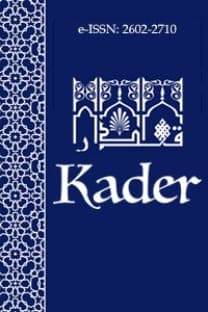Alevîlik Bektâşîlik Hakkında Tartışmalı Kavramlar
Kelam, Alevîlik, Bektâşîlik, Heterodoksi, Ortodoksi, Senkretizm
Controversial Issues on Alevism and Bektashism
Kalam, Alevism, Bektashism, Heterodoxy, Ortodoxy, Cyncretism,
___
- Aygün, Hüseyin. “Hüseyin Aygün’den Zorunlu Din Dersi Raporu, Zorunlu Din Derslerinden Hâkim Sünnîliğe: İlâhiyatçı, Müftü ve Din Hocalarının Eliyle Alevî Çocuklarına Yapılan Kıyım ve Zulüm Üzerine”. Erişim 21 Kasım 2014. http://dersimnews.com/alevilik/2014-11-22/huseyin-aygunden-zorunlu-din-dersi-raporu
- Livni, Eran. “Alevi Identity in Turkish Historiography”.Erişim 10 Ekim 2016. http://www.academia.edu/817017/Alevi_Identity_in_Turkish_Historiography
- Aysevener, Kubilay. Tarih Felsefesi. İstanbul: Cem Yayınevi, 2003.
- Bruneissen Van. “Iranian Oral History Project”. Erişim 10 Nisan 2014.htp://ted.lib.harvard.edu/ted/deliver/home?_collection=iohp -“The Oral History Journal, The Yezidi Oral on Iraqi Kurdistan, International Oral History Association”. Erişim 10 Nisan 2014. http://www.iohanet.org/home/
- Colpe, Carsten. The Phenomenon of Synretism and Impact of Islam, Syncretistic Religious Communities in The Near East. Brill Publishing, Leiden 1997.
- Çelebi, Nilgün. Sosyoloji ve Metodoloji Yazıları. Ankara: Anı Yayıncılık, 2001.
- Dieter, Hans vd. “Syncretism” Religion Past and Present: Encyclopedia of Theology and Religion. Leiden: Brill Publishing, 2007.
- Dressler, Marcus. “How to Conceptualize Inner-Islamic Plurality/Difference: 'Heterodoxy' and Syncretism' in the Writings of Mehmet F. Koprulu (1890-1966)”. British Journal of Middle Eastern Studies British Society for Middle Eastern Studies Bulletin 37/3 (December 2010), 246-252.
- Dressler, Markus. “Irene Melikoff’un Mirası: Metodolojiye Dair Bazı Düşünceler”. Türk Kültürü ve Hacı Bektaş Veli Araştırması Dergisi 52 (2009), 13-20.
- Elwert, Georg. Switching of We-Group Identities: The Alevis as a Case Among Many Others Alevism in Turkey and Comparable Syncretistic Religious Communities in the Near East in the Past and Present. Berlin: Brill Publishing, 1997.
- Fığlalı, Ethem Rûhi. Çağımızda İtikadî İslâm Mezhepleri. Ankara: Selçuk Yayınları, 1993.
- Gibb, H. A. R - Bowen, Harold. Islamic Society and the West; a Study of Impact of Western Civizilation on Muslim Culture in the Near East: Islamic Society in the Eighteenth Century. London: Oxford University Press, 1971.
- Hamzeh’ee, Fariborz - M., Reza. Methological Notes On İnterdisciplinary Research, Synretistic Religious, Communities. Berlin: 1995.
- -Syncretistic Religious Communities in the Near East Papers of the International Symposium. 1997.
- Henderson, John. The Construction of Orthodoxy and Heresy: Neo-Confucian, Islamic, Jewish, and Early Christian Patterns. New York: State University of New York Press, 1998.
- Irene, Melikoff. Hacı Bektaş; Efsâneden Gerçeğe. İstanbul: Cumhuriyet Kitapları, 1998.
- -Uyur İdik Uyandırdılar. çev. Turan Alptekin. İstanbul: Demos Yayınları, 1993.
- -L’Islam Heterodoxe en Anatolie: non-Conformisme-Synretisme-Gnose”. Turcica 14 (1982), İstanbul: Reprints in Sur Recherches sur l’Islam Populaire en Anatolie. ISIS Press, (1992). 140-152.
- İbn Mâce. Sünen- İbn Mâce Tercemesi ve Şerhi. çev. Haydar Hatipoğlu. II Cilt. İstanbul: Kahraman Yayınları, 1982.
- Kafadar, Cemal. Between Two Worlds, Construction of the Ottoman State. London: London Press, 1995.
- Karolewski, Janina.”What is Heterodox About Alevism”. Die Welt des Islams 48/3-4 (2008), 434-456.
- Kehl-Bodrogi, Krisztina. Alevism in Turkey and Comparable Syncretistic Religious Communities in the Near East in the Past and Present. Collected Papers of the International Symposium Berlin: 1997.
- Kutlu, Sönmez. Alevîlik Bektaşîlik Yazıları Alevîliğin Yazılı Kaynakları. Ankara: Ankara Okulu Yayınları, 2006.
- Livni, Eran. “Alevi Identity in Turkish Historiography”. www.academia.edu. Erişim 10 Ekim 2016. http://www.academia.edu/817017/Alevi_Identity_in_Turkish_Historiography
- Melikoff, Irene. Kırkların Cemi’nde. çev. Turan Alptekin. İstanbul: Demos Yayınları, 2007.
- Melikoff, Irene. La Divinisation d’Alichezles Bektachis Alevîs, Aubanquet Desquarante: Exploration Au ceaurdu Bektachisme-Alevisme. İstanbul: İsis Yayınları, 2001.
- Ocak, Ahmet Yaşar. Tarihten Teolojiye İslâm İnançlarında Hz. Ali. Ankara: Türk Tarih Kurumu, 2007.
- Ocak, Ahmet Yaşar. “Alevîlik ve Bektaşîlik Son Yayınlar Üzerinde Genel Bakış ve Bazı Gerçekler”. Tarih ve Toplum 16/91 (Temmuz 1991), 20-25; 16/92 (Ağustos 1991), 51-5.
- Ortaylı, İlber. Tarih Yazıcılık Üzerine. Ankara: Cedit Neşriyat, 2009.
- Öktem, Niyazi. Anadolu Alevîliğinin Senkretik Yapısı. İstanbul: Truva Yayınları, 2011.
- Öz, Baki. Alevîlik ile İlgili Osmanlı Belgeleri: Fermanlar, Beratlar, Fetvâlar, Lahiyalar, Mektuplar, Vakıfnameler, Mahkeme Tutanakları, Mühimme Defteri Kayıtları, Vakâyinâmelerden Parçalar. İstanbul: Can Yayınları, 1995.
- Sezgin, Abdülkadir. Sosyolojik Açıdan Alevîlik-Bektaşîlik. Ankara: Yeni Türkiye Yayınları, 2002.
- Shankland, David. Anthropology and Ethnicity: ThePlace of Ethnography in the Alevi Movement. İstanbul: İstanbul Swedish Research Institute, 2002.
- Shankland, David. “Maps and the Alevis: On the Ethnography of Heterodox Islamic Groups”. British Journal of Middle Eastern Studies 37/3 (2010), 227-239.
- Simon, Udo-Langer, Robert. “The Dynamics of Ortodoxy and HeterodoxyDealing with Divergence in Muslim Discourses and Islamic Studies”. Die Welt des Islam 48 (2008), 273-288.
- Stewart, Charles. Idiosynretic Etimology an Syncretistic Controversy, Synretism/Anti-Syncretism. London: Routledge Publishing, 1994.
- Stonov, Yuri. “Early and Recent Formulations of Theories for a Formative Christian Heterodox Impact on Alevism”, edit, Shankland David (British Journal of Middle Eastern Studies, Volume 37, Number 3 December, London: Routledge Publishing, 2010.
- Şahin, Murat. “Bitmeyecek Cami-Cemevi Tartışması”. Erişim 15 Ekim 2013. https://groups. google.com/forum/#!msg/peyikci/f4ynyWxHhcs/ijLRxPf65HgJ
- Şimşek, Ahmet. Tarih Nasıl Yazılır? Tarih Yazımı İçin Çağdaş Bir Metodoloji. İstanbul: Yeditepe Yayınevi, 2011.
- Steinmetz, Sol. Webster’s Desk Dictionary. New York: Gramercy Books, 1996.
- Türkdoğan, Orhan. Alevî-Bektaşî Kimliği: Sosyo-Antropolojik Araştırma. İstanbul: Timaş Yayınları, 1995.
- Türk Dil Kurumu. Erişim 15 Kasım 2012. http://www.tdk.gov.tr/index.php?option=com_gts&arama=gts&guid=TDK.GTS. 548058567f9798.97327379
- Uzun, Mustafa. ”Ebced”. Türkiye Diyanet Vakfı İslâm Ansiklopedisi. 10/68-70. Ankara: TDV Yayınları, 1989.
- Wakamatsu, Hiroki. "Batı'daki Alevî İncelemeleri: Oryantalizm ve Dinlerarası Dialog”.İslâmî Araştırmalar Dergisi 20/2, Ankara: Türkiye Ekonomi ve Kültürel Dayanışma Vakfı, 2007.
- Yurdagür, Metin.”Cefr”, Türkiye Diyanet Vakfı İslâm Ansiklopedisi. 7/215-218. Ankara: TDV Yayınları, 1989.
- Yayın Aralığı: 2
- Başlangıç: 2003
- Yayıncı: Mehmet BULĞEN
Ruhçu Düşünceye Karşı Bir Argüman Olarak Ayrık-Beyin Vakası
İbn Hazm’a Göre Keramet ve Mahiyeti
Kur’an’ın Özgün ve Benzeşimli Ayetleri: Muhkem ve Müteşâbih
Alevîlik Bektâşîlik Hakkında Tartışmalı Kavramlar
Lafızlarının Aidiyetine Dair Tefsir Geleneğindeki Tartışmalar ve Bunların Kritiği
İlâhî Sıfatların Ontik Değeri Konusunda Fahreddîn er-Râzî’nin Mu‘tezilî Eğilimi
Câhız’ın Ahlâk Teorisine Göre Mizacın Değişmesi ve Pratik Değeri
Kelâm Düşüncesinde Antropomorfik Tanrı Tasavvurları
Bir Muhaddisten Muʻtezile Manifestosu: Ebû Saʻd es-Semmân’ın Vasiyeti
